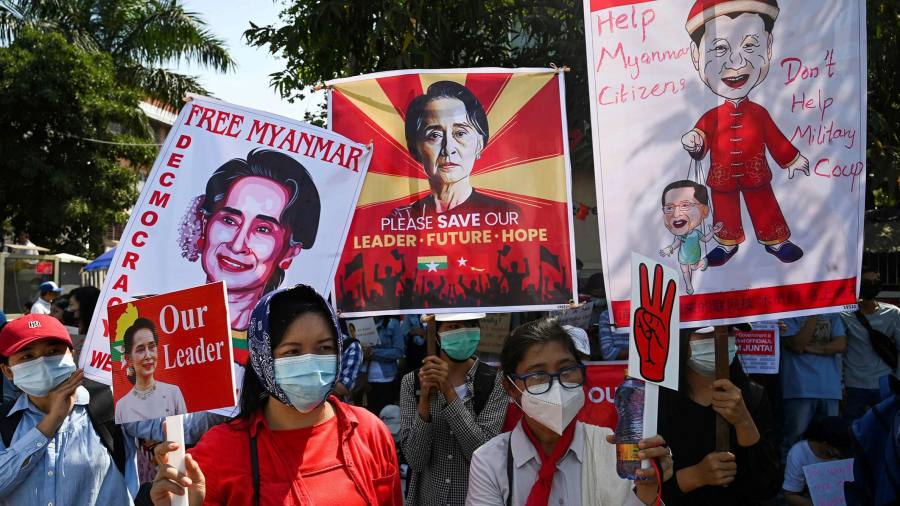Members of a nationwide civil disobedience movement opposing Myanmar’s coup are venting their anger at China, which protesters accuse of helping the generals who overthrew Aung San Suu Kyi.
Anti-coup demonstrators have massed outside the Chinese embassy in Yangon over the past week, holding placards attacking Beijing or showing President Xi Jinping dangling senior General Min Aung Hlaing, the junta chief, by marionette strings.
Activists have in recent days launched an online campaign to boycott Chinese products. Some have even called for attacks on the natural gas pipeline linking China’s Yunnan province to Myanmar’s port of Kyaukphyu, a flagship infrastructure project.
The junta have over the past three nights ordered telecoms operators to shut down internet service overnight, stoking speculation that it is installing a site-censoring “great firewall†with China’s help.
“China! Don’t make firewall to block internet in Myanmar,†one of the signs held up by protesters at a recent embassy protest said.
A junta spokesman on Tuesday denied China was building a firewall, adding that Myanmar had enough experts to do so itself.
Chinese officials have sent ambiguous and at times conflicting signals about Beijing’s stance since the coup. However, the youth taking to Myanmar’s streets and social media in hopes of reversing the coup have made up their minds that China is involved.
“There is hate speech against the Chinese, calling for attacks or assaults on Chinese nationals or Chinese projects because China has abandoned ‘The Lady’,†said Yun Sun, an expert on Myanmar-China relations at the Stimson Center, a think-tank, referring to Aung Sung Suu Kyi.
The resurfacing of anti-Chinese sentiment puts Beijing, Myanmar’s biggest trading partner, in a delicate position with a strategically important regional ally. It also adds a mercurial element to the protests in a country that has suffered deadly bouts of racial violence, including anti-Chinese riots in 1967.
Zhao Gancheng, a foreign policy expert at the Shanghai Institutes for International Studies, said China’s most immediate concern remained the potential for unrest spreading and further destabilising Myanmar. “China is of course mostly worried about the political situation getting out of control,†he said.
Since last week, Myanmar social media has been alight with rumours after a series of cargo flights — confirmed by flight tracker websites — from the Chinese city of Kunming landed in Yangon when the country’s airspace was restricted.
Protesters have speculated that the flights contained internet-blocking information technology software, or Chinese soldiers.
Telenor, the Norwegian telecoms provider that has since the coup published all orders from junta authorities on its website, said on Sunday that it could no longer do so and that it was “gravely concerned with this developmentâ€. In an interview with the Financial Times, its chief executive, Sigve Brekke, declined to say why it had done so.
The Chinese chamber of commerce in Yangon did little to damp down the speculation — and was derided by anti-coup protesters — when it urged people not to spread “false rumoursâ€. It said the round-trip flights were part of normal import and export routes and included products such as seafood.
The friction highlighted the complex relationship between the two countries, whose economic ties are growing stronger. Before the coup, Myanmar was an expanding consumer market for Chinese goods. And China has a decades-long record of arms deals and secretive business ties with members of the military elite.
However, China also had solid, if at times touchy, relations with the civilian government overthrown this month. During a visit by Xi to Myanmar last year, Aung San Suu Kyi signed off on a string of Belt and Road Initiative infrastructure deals. China also stood by her government when it faced international condemnation over the crackdown on Rohingya Muslims.
“In many ways, the relationship between the two countries has been stable under Aung San Suu Kyi,†said Enze Han, an associate professor of politics at the University of Hong Kong. “That’s why I can’t see any reason why China would want the military to come back, with consequences like sanctions.â€
In Myanmar, however, suspicions about China’s intentions have grown since the day of the coup. In one early news report, the official news agency Xinhua described the arrest of Aung San Suu Kyi and scores of other government officials as a “major cabinet reshuffleâ€.
At the UN Security Council, China — along with Russia, another traditional ally of Myanmar’s military — initially blocked a resolution drafted by the UK condemning the coup. However, later in the week, Beijing and Moscow both endorsed a Security Council statement expressing “deep concern†and calling for the release of imprisoned officials.
Russia and China also backed a UN Human Rights Council resolution calling for the release of prisoners but later disassociated themselves from it. Chen Xu, China’s representative, described events in Myanmar as the country’s “internal affairsâ€, and said it was working with all relevant parties to de-escalate tensions “and bring the situation back to normalâ€.
Additional reporting by Nian Liu
[ad_2]







